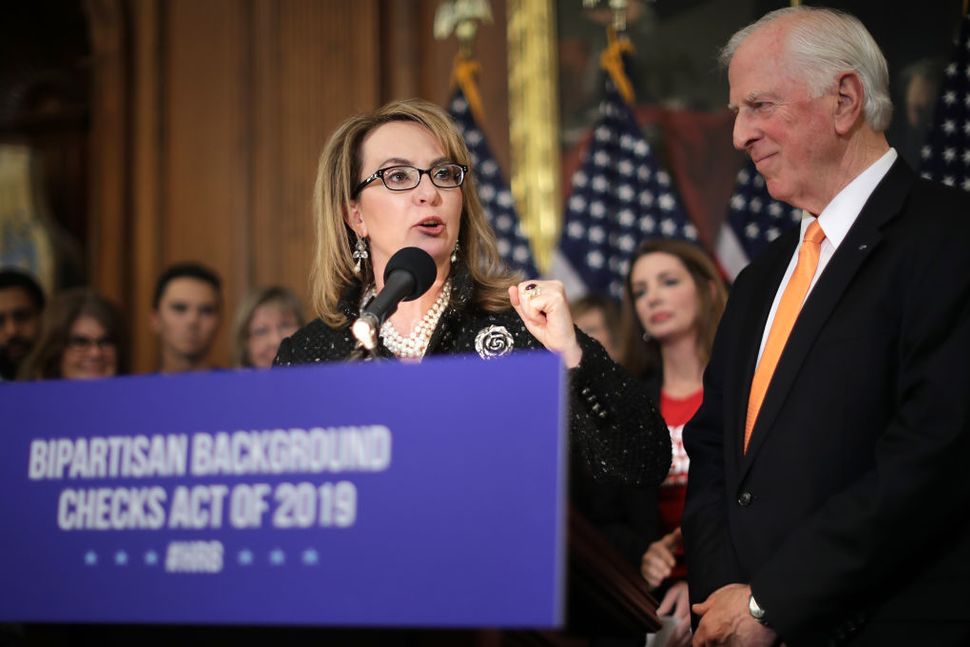Gun Control
Democratic-Led House Poised for Historic Votes on Gun Control
The measures would face long odds in the GOP-controlled Senate, but they reflect a growing acknowledgement among Democrats – and some Republicans – that legislation is needed.
The House this week is slated to consider bills that would expand background checks for all gun sales and extend the deadline of those checks – historically significant votes on measures that would face an uphill battle in the GOP-controlled Senate but highlight how Democrats have shifted in recent years to make gun control a top priority..
One bill, sponsored by Rep. Mike Thompson, D-Calif., and Rep. Peter King, R-N.Y., would require universal background checks for all gun sales, including private transactions. Current federal law only mandates background checks for purchases from licensed gun dealers.
The Bipartisan Background Checks Act of 2019 is expected to clear the Democratic-led House, with 232 co-sponsors. Of those co-sponsors, only five of them are Republicans, including King and Reps. Brian Fitzpatrick of Pennsylvania, Fred Upton of Michigan, Brian Mast of Florida and Chris Smith of New Jersey.
The other bill, the Enhanced Background Checks Act of 2019, would increase the window of time for a background check to be completed from three days to 20 days. Rep. James Clyburn, D-S.C., authored the bill and freshman Rep. Joe Cunningham, D-S.C., and King are among the co-sponsors.
The Bipartisan Background Checks Act of 2019 is the first standalone gun-control measure that the House will vote on in more than two decades. That measure seeks to close the "Charleston Loophole," a reference to the process that permitted the shooter in a 2015 South Carolina mass shooting at a black church to purchase a gun.
Both measures are likely to face hurdles in the Senate. Even if they win enough Republican votes to pass the upper chamber, the bills would almost certainly be vetoed by President Donald Trump.
Former Rep. Gabrielle Giffords, D-Ariz., a leading gun control proponent who was seriously injured in a 2011 shooting in Tucson, is holding a press conference on Capitol Hill Tuesday with several Democratic House members in support of the universal background checks bill, a spokesman confirmed.
Giffords will be joined by Thompson, as well as Democratic Reps. Lucy McBath of Georgia, Jason Crow of Colorado and Ted Deutch of Florida. That bill was introduced on the eighth anniversary of the Tucson shooting.
A number of Democrats, including Crow and McBath, ran on a platform of gun control during the 2018 midterms. They flipped two GOP-held seats in suburban districts, helping Democrats to regain the House majority.
McBath was motivated to run for Congress because her 17-year-old son was fatally shot in 2012.
Meanwhile, both gun measures have garnered scorn from the National Rifle Association and other gun rights activists. The NRA argues that the universal background checks bill "criminalizes the private transfer of firearms and targets law-abiding gun owners for persecution," including those who loan guns to family or friends.
But the Bipartisan Background Checks Act of 2019 makes some exceptions, which include allowing a transfer that is a "loan or bona fide gift" between family members. It also permits a temporary transfer for firearm use on a shooting range or hunting.
Some Republicans, like Rep. Greg Steube, R-Fla., argue that the universal background check bill wouldn't have prevented a recent mass shooting at a high school in Parkland, Florida, noting that the shooter in that case passed a background check.
,Democrats' embrace of the issue is a marked shift from even several years ago when the party shied away from introducing gun control bills. The issue gained steam in the wake of the Parkland high school shooting that killed 17 people.
In the days ahead of the vote, House Speaker Nancy Pelosi, D-Calif., and Senate Minority Leader Chuck Schumer, D-N.Y., are scheduled to address the Brady Campaign to Prevent Gun Violence's reception on Tuesday night, marking the 25th anniversary of the Brady Law which mandated background checks on gun sales from federally licensed dealers.
"You want to talk about a national emergency?" Pelosi said earlier this month. "Let's talk about today, the one-year anniversary of another manifestation of the epidemic of gun violence in America. That's a national emergency. Why don't you declare that emergency, Mr. President? I wish you would."
This week's votes are the biggest push for gun control in years. Following the 2012 Sandy Hook Elementary School shooting in Newtown, Connecticut, a bipartisan bill on universal background checks, authored by Sens. Joe Manchin, D-W.Va., and Pat Toomey, R-Pa., ultimately failed to win enough support in 2013.
Even if the measures fall short of becoming laws, the votes signal that gun control will continue to be a large part of the conversation in future Democratic campaigns.
Some 2020 Democratic presidential candidates have had changing attitudes on guns, including Sen. Kirsten Gillibrand, D-N.Y., and Sen. Bernie Sanders, I-Vt.
Gillibrand recently said she's "embarrassed" by her past positions. While representing a conservative House district, Gillibrand had touted her "A" rating from the NRA. But she has since been supportive of gun control, particularly in the wake of the Tucson and Sandy Hook shootings.
Well-known gun control advocates are also testing the waters for a potential 2020 run. Former New York City Mayor Michael Bloomberg has been considering a run for the Democratic nomination. He spent millions of dollars to help Democrats take back the House in 2018 and helped propel candidates who embraced the issue.
Gun control is likely to also be a prominent theme in some down-ballot races.
Retired astronaut Mark Kelly, who's married to Giffords, is running for Arizona's Senate seat in 2020. In his campaign launch video, he talked about the 2011 Tucson shooting and plans to make the issue main component of his Senate campaign.














